
Alpine Botany
Scope & Guideline
Exploring the Heights of Alpine Flora.
Introduction
Aims and Scopes
- Biodiversity and Ecology of Alpine Flora:
Research on the diversity of plant species in alpine environments, including their ecological interactions, distribution patterns, and the factors influencing their composition. - Effects of Climate Change on Alpine Ecosystems:
Studies examining how climate change impacts alpine ecosystems, including shifts in plant phenology, species distributions, and plant-pollinator interactions. - Plant Physiology and Adaptation:
Investigations into the physiological traits of alpine plants and their adaptations to extreme environmental conditions, such as high altitude, low temperatures, and varying moisture levels. - Conservation and Restoration Efforts:
Research aimed at understanding the conservation needs of alpine species and communities, including restoration strategies for degraded alpine habitats. - Phylogeography and Evolution:
Studies exploring the evolutionary history and genetic diversity of alpine plants, often linking past climatic events to current species distributions.
Trending and Emerging
- Climate Change Impact Studies:
An increasing number of publications are focusing on the effects of climate change on alpine ecosystems, particularly in relation to plant phenology, species interactions, and community dynamics. - Plant-Pollinator Interactions:
Research on the complexities of plant-pollinator relationships in alpine environments is gaining traction, particularly regarding how these interactions are impacted by climate change and habitat alterations. - Molecular and Genetic Approaches:
There is a growing trend towards employing molecular techniques to study genetic diversity and evolutionary processes in alpine plants, enhancing understanding of their adaptability and resilience. - Community Dynamics and Functional Diversity:
Emerging studies are increasingly exploring the functional diversity within alpine communities and how interspecific interactions shape ecosystem responses to environmental changes. - Restoration Ecology:
Research focused on restoration practices in alpine environments is becoming more prominent, reflecting an urgent need for effective conservation strategies in the face of habitat loss and climate change.
Declining or Waning
- Traditional Taxonomy and Flora Surveys:
Research focused solely on the taxonomic classification of alpine flora has diminished, possibly due to a shift towards more integrative approaches that combine genetics, ecology, and climate studies. - Single-Species Studies:
There has been a noticeable decrease in studies dedicated to single-species investigations, as the focus has shifted towards multi-species interactions and community-level analyses. - Static Biodiversity Assessments:
Static assessments of biodiversity without considering temporal changes or the impacts of climate dynamics are becoming less common, as researchers emphasize the need for long-term studies that capture ecological shifts.
Similar Journals

FOLIA GEOBOTANICA
Uncovering the past to illuminate the future of plant ecology.FOLIA GEOBOTANICA, published by Springer, is a distinguished journal dedicated to advancing the fields of Paleontology and Plant Science through the dissemination of high-quality research. With an ISSN of 1211-9520 and an E-ISSN of 1874-9348, this journal has been pivotal in providing a platform for innovative studies from 1994 to 2024. Notably, FOLIA GEOBOTANICA holds a Q3 ranking in Paleontology and a Q2 ranking in Plant Science as of 2023, affirming its relevance and contribution to the scholarly community. The journal is located in the Netherlands at VAN GODEWIJCKSTRAAT 30, 3311 GZ DORDRECHT, and is not an Open Access publication, ensuring comprehensive review processes and scholarly integrity. With Scopus rankings that place it in the 50th percentile for Plant Science and 46th for Paleontology, FOLIA GEOBOTANICA continues to attract researchers, professionals, and students who are keen to explore the intricacies of plant ecology and fossil records, thereby fostering a deeper understanding of ecological and evolutionary patterns.
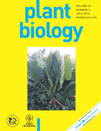
PLANT BIOLOGY
Cultivating Knowledge in Ecology and EvolutionPLANT BIOLOGY is a prestigious academic journal published by Wiley, dedicated to advancing knowledge in the fields of plant science, ecology, and evolutionary biology. With an impressive impact factor and ranking in the Q1 category for Ecology, Evolution, Behavior and Systematics, and Plant Science as of 2023, it stands at the forefront of research dissemination. The journal encompasses a broad scope of plant biology topics, providing a critical platform for researchers to share innovative findings and foster interdisciplinary collaboration. Available in both print (ISSN: 1435-8603) and online formats (E-ISSN: 1438-8677), it ensures accessibility through open access options. As a crucial resource for professionals, researchers, and students alike, PLANT BIOLOGY cultivates a deeper understanding of plant systems and their ecological significance, making it an essential addition to the library of anyone dedicated to the study of biology and the environment.

BOTANICAL REVIEW
Pioneering insights in Ecology and Plant Science.BOTANICAL REVIEW is a highly esteemed journal published by SPRINGER, renowned for its commitment to advancing the fields of Ecology, Evolution, Behavior and Systematics and Plant Science. Established in 1935, this journal has become a cornerstone for researchers and professionals, reflecting over eight decades of rigorous scholarship. With an impressive impact factor and ranking within the top quartile for both its fields—Q1 in Ecology, Evolution, Behavior and Systematics and Plant Science—BOTANICAL REVIEW remains a key platform for disseminating critical findings and fostering scientific dialogue. Although it is not an open-access journal, its accessibility through institutional subscriptions enhances its reach among the academic community. The journal not only emphasizes the ecological aspects of plant life but also integrates evolutionary context to inform current practices and theories in botany. With a dedication to exploring the complex interactions within botanical sciences, BOTANICAL REVIEW continues to shape the future of plant research.

Gorteria
Elevating Understanding of Plant LifeGorteria is a distinguished academic journal published by the Naturalis Biodiversity Center in the Netherlands, focusing on the rich field of plant science. With a publication history that spans from 1988 to 2020 and recently resuming in 2022, Gorteria serves as a critical platform for disseminating research findings, reviews, and insights in botanical studies. Although it is categorized within the Q4 quartile, it aims to elevate the understanding of plant biodiversity and ecology, playing a vital role in fostering academic discourse and encouraging the advancement of knowledge in the field. Researchers, professionals, and students will benefit from its curated content as it contributes to global biodiversity efforts and environmental sustainability. For those seeking to explore the latest discoveries in plant science, Gorteria offers a cohesive blend of rigorously reviewed articles that inform and inspire.
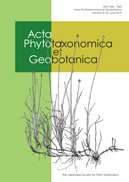
Acta Phytotaxonomica et Geobotanica
Innovating Research in Biodiversity and SystematicsActa Phytotaxonomica et Geobotanica, published by the Japanese Society for Plant Systematics at the University of Tokyo, serves as a vital platform for advancing research in the fields of ecology, plant science, and biodiversity. With an ISSN of 1346-7565 and an E-ISSN of 2189-7042, this journal not only provides a comprehensive evaluation of current topics within these categories but also addresses the intricate connections between plant systems and their ecological environments. Although currently not open access, the journal is essential for researchers aiming to publish cutting-edge findings, contributing significantly to its classification within the Q3 quartile across multiple disciplines, including Ecology and Plant Science. With an ambitious focus on enhancing the understanding of plant taxonomy and geography through a convergence of research periods from 2014 to 2024, Acta Phytotaxonomica et Geobotanica plays a pivotal role in fostering academic discourse and innovation in plant systematics. Its geographical foundation in Japan enriches the journal's unique perspective on regional flora, making it an indispensable resource for students, researchers, and professionals in the field.
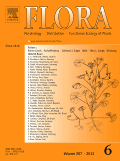
FLORA
Exploring the Depths of Plant Science and EcologyFLORA is a distinguished journal published by Elsevier GmbH, focusing on the realms of Ecology, Plant Science, and Evolutionary Biology. Established in 1975, this journal has been a vital platform for researchers and professionals, disseminating groundbreaking findings and insights relevant to the plant sciences. With an impressive impact factor and a current Scopus ranking placing it in the second quartile (Q2) across multiple categories, FLORA is recognized as a critical resource for advancing knowledge in its respective fields. The journal publishes both traditional research articles and significant review papers, ensuring a broad spectrum of academic engagement. Although not open access, FLORA remains committed to enhancing the scientific discourse and fostering collaboration among scholars worldwide. Researchers seeking to enrich their understanding of ecological dynamics and plant biology will find FLORA to be an essential addition to their academic repertoire.

GAYANA BOTANICA
Empowering researchers to grow the field of botany.GAYANA BOTANICA is a prominent academic journal that specializes in the fields of Ecology, Horticulture, and Plant Science, published by EDICIONES UNIV, CONCEPCION in Chile. Established in 1981, this journal has become a vital resource for researchers and professionals seeking to advance their knowledge and contribute to the understanding of botanical sciences, offering a diverse range of articles that explore the ecology of plants, horticultural practices, and innovative plant science methodologies. Although it currently holds a Q4 quartile ranking in its categories, the journal’s commitment to disseminating valuable scientific findings continues to strengthen its relevance in the field. With its focus on promoting original research and fostering dialogue among scholars, GAYANA BOTANICA plays an essential role in supporting the global scientific community. We invite researchers, academics, and students to engage with its content and explore advancements that are shaping the future of plant sciences.

Annali di Botanica
Bridging theory and practice in plant research.Annali di Botanica is a distinguished journal published by UNIV STUDI ROMA LA SAPIENZA that has become a vital platform for advancing research in the field of plant sciences. With its Open Access policy established since 1995, it ensures that a wide audience including researchers, professionals, and students can access high-quality, peer-reviewed articles that contribute to the global body of botanical knowledge. As of 2023, the journal holds a Q3 rank in the Plant Science category, reflecting its commitment to scholarly excellence and relevance, as evidenced by its position within the 62nd percentile of activities ranked in Scopus. The journal encompasses diverse topics in botany, fostering discussions that encompass morphological, ecological, and genetic aspects of plants, effectively bridging theoretical knowledge and practical applications. Situated in the heart of Rome, Italy, at PIAZZALE ALDO MORO, 5, the journal not only addresses regional botanical issues but aims to serve a global audience, enhancing collaborative efforts and stimulating innovation across the botanical sciences.
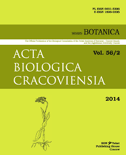
ACTA BIOLOGICA CRACOVIENSIA SERIES BOTANICA
Cultivating knowledge, enriching biodiversity.ACTA BIOLOGICA CRACOVIENSIA SERIES BOTANICA is a distinguished journal published by the Polska Akademia Nauk (Polish Academy of Sciences), with its roots tracing back to 1996. As a pivotal publication in the field of Plant Science, it serves to disseminate high-quality research and findings, contributing to the ongoing development and understanding of biodiversity, plant ecology, and conservation. The journal is indexed under Scopus, ranked #203 out of 516 in its category, placing it in the 60th percentile and firmly within Q3 quartile for Plant Science in 2023. Researchers, professionals, and students will find invaluable content within its pages, enhancing their knowledge and supporting academic exploration. Although it currently does not offer open access options, the journal remains a crucial resource for those engaged in botanical sciences, with a commitment to advancing scholarship in Poland and beyond.
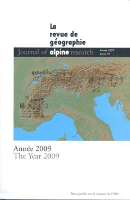
Revue de Geographie Alpine-Journal of Alpine Research
Advancing Understanding of Alpine Environments and CulturesRevue de Geographie Alpine-Journal of Alpine Research is a distinguished academic journal published by IGA-ASSOC DIFFUSION RECHERCHE ALPINE, focusing on the multifaceted disciplines of geography, environmental science, and alpine research. Since its inception in 1977, this peer-reviewed journal has established itself as a vital resource for scholars aiming to contribute to the understanding of Alpine environments, cultures, and issues related to sustainability. With an open-access model since 2007, the journal provides unrestricted access to its rich repository of research, enhancing visibility and global collaboration among researchers. The journal is indexed in Scopus and has been categorized in the Q4 quartile for both Earth-Surface Processes and Geography, Planning and Development as of 2023, positioning it as a relevant yet emerging platform within the academic community. The Revue de Geographie Alpine is committed to fostering dialogue and knowledge-sharing among researchers, professionals, and students dedicated to alpine studies, making it an essential contribution to the field.